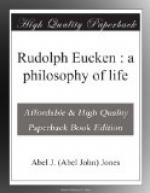THE PROBLEM OF LIFE
Before we proceed to outline Eucken’s philosophical position, it will be well if we can first be clear as to the special problem with which he concerns himself. Philosophers have at some time or other considered all the problems of heaven and earth to be within their province, especially the difficult problems for which a simple solution is impossible. Hence it is, perhaps, that philosophy has been in disrepute, especially in English-speaking countries, the study of the subject has been very largely limited to a small class of students, and the philosopher has been regarded as a dreamy, theorising, and unpractical individual.
Many people, when they hear of Eucken, will put him out of mind as an ordinary member of a body of cranks. From Eucken’s point of view this is the most unfortunate thing that can happen, for his message is not directed to a limited number of advanced students of philosophy, but is meant for all thinking members of the human race.
The problem he endeavours to solve is far from being one of mere theoretical interest; on the contrary it has to do with matters of immediate practical concern to the life of the individual and of the community. To ignore him will be to fail to take account of one of the most rousing philosophies of modern times.
The apathy that exists in regard to the subject of philosophy is not easy to explain. It is not that philosophising is only possible to the greatest intellects; it is indeed natural for the normal mind to do so. In a quiet hour, when the world with its rush and din leaves us to ourselves and the universe, we begin to ask ourselves “Why” and “How,” and then almost unconsciously we philosophise. Nothing is more natural to the human mind than to wonder, and to wonder is to begin to philosophise.
Perhaps philosophers have been largely to blame for the indifference shown; their terms have often been needlessly difficult, their language obscure, and their ideas abstruse. Too often, too, their abstract speculations have caused them to ignore or forget the actual experience of mankind.
Those who have quarrelled with philosophy for these or other reasons will do well to lay their prejudices aside when they start a study of Eucken, for though he has some of the faults of his class, he has many striking and exceptional excellences.
Philosophers in general set out to solve the riddle of the universe. They differ in their statement of the problem, in the purpose of the attempt, and in their methods of attempting the solution. Some will wonder how this marvellous universe ever came into existence, and will consider the question of the existence of things to be the problem of philosophy. Others in observing the diversity of things in the universe wonder what is behind it all; they seek to go beyond mere appearances, and to investigate the nature of that behind the appearances, which they




